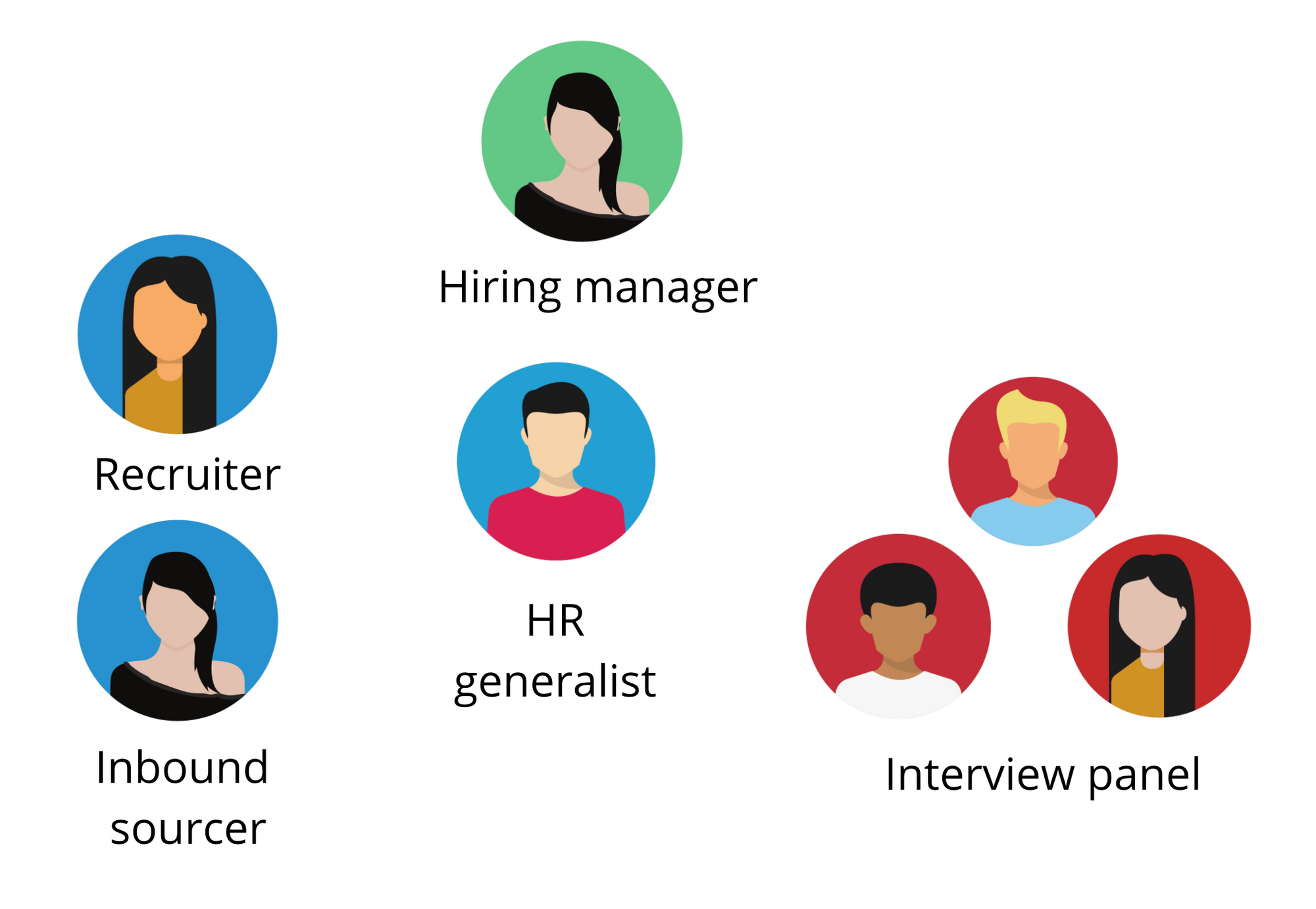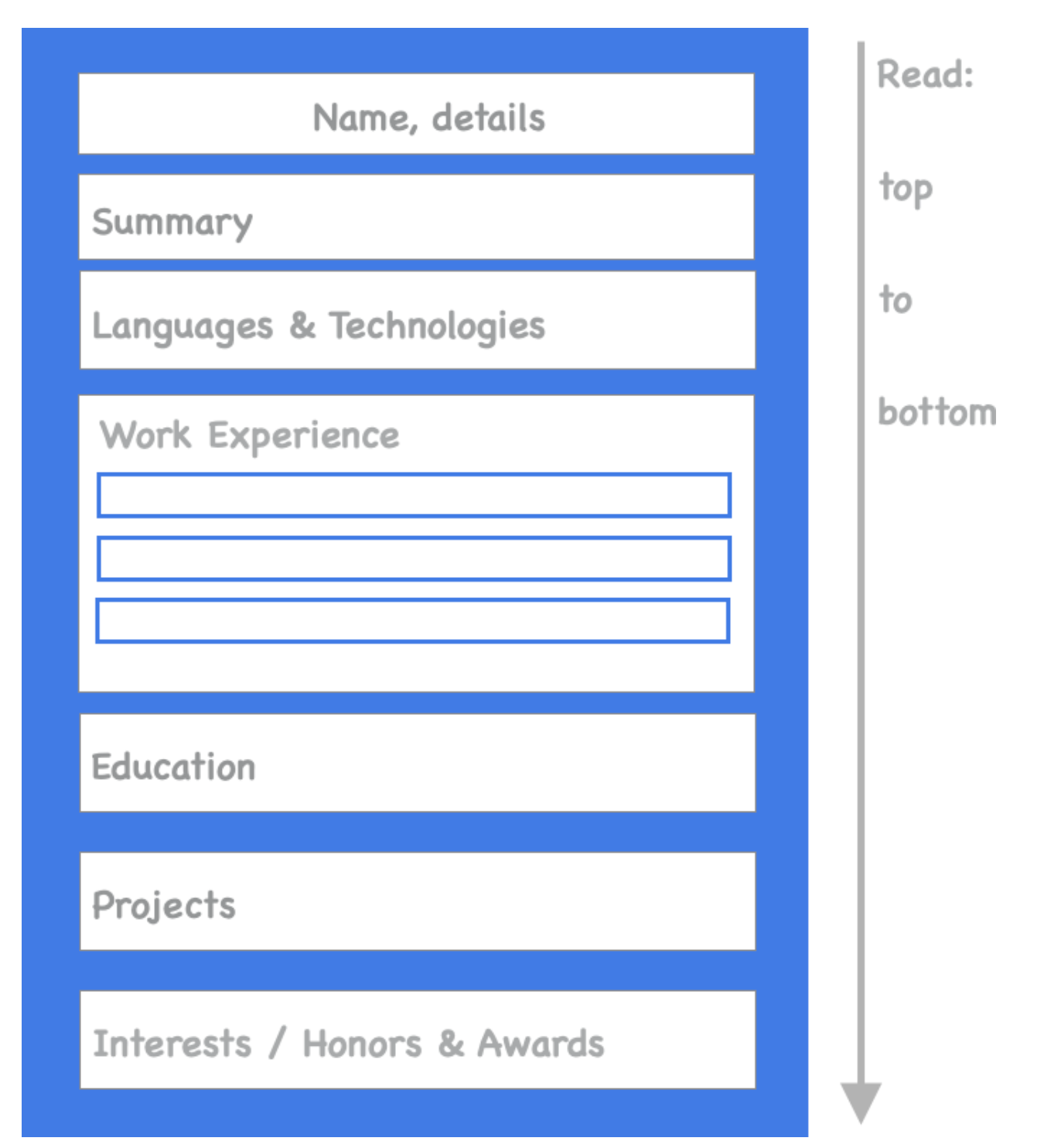By Gergely Orosz
As a hiring manager, I’ve read hundreds of software developer resumes.
I’ve also talked to and interviewed dozens of recruiters and hiring managers who work at Facebook, Google, Spotify, Amazon, and other tech companies about the same topic while writing The Tech Resume Inside Out.
You’ve probably heard the statistic that recruiters spend an average of 6 seconds scanning a resume. And my experience confirms this.
But there are a lot of things you can do to make recruiters and hiring managers read what you want them to read on the first CV scan.
Let's take a step back: who will read your resume?
Before jumping into advice on your resume format and content, we need to pause. Do you know who will actually read your resume at the company? Whose attention do you need to catch?
Here are the people who will - or could - read your resume.
 People in the hiring process who could read your resume
People in the hiring process who could read your resume
Let's look at each of their roles in more detail.
How hiring managers will read your resume
Hiring managers are the people who opened the position—or headcounts, as it’s internally called.
They define the requirements and often write the job description. They set up the hiring process and define who the technical interviewers will be and what areas they should focus on.
And at smaller companies, they might screen all incoming resumes. But as the company grows, they won’t have time to do this.
How HR generalists will read your resume
HR generalists might do resume screening at growing companies, who have yet to hire a dedicated recruiter.
These people get guidance from hiring managers and then try to see if there’s an overlap between your resume, the job description, and what the hiring manager asked for.
How recruiters will read your resume
Recruiters often do most resume screening at mid-sized companies.
Some recruiters are more hands-on and understand technical terms better. Some might be closer to an HR generalist in their technical domain knowledge.
Recruiters will aim to determine if you could be a fit for the role based on your resume.
How inbound sourcers will read your resume
Inbound sourcers are a specialized role within large tech companies, who get large loads of applications. They are recruiters who focus on sorting through the direct applications and do this for multiple positions at any given time.
Inbound sourcers tend to strictly follow the job requirements and guidance from recruiters and hiring managers. They are the ones who usually see the most resumes on any given day between all the roles discussed here.
How the interview panel will read your resume
The interview panel is the group of people who will interview you, assuming you make it through the resume screening (and, possibly, a recruiter call).
They get your resume forwarded and do a quick read-through before the interview.
There’s no need to impress this group: they are the people who might pay attention to your “interests” section, though, to kick off the conversation with an icebreaker.
Almost everyone who scans your resume will care that it shows you are a good fit for the job you applied for.
HR generalists, recruiters, and inbound sourcers all focus on the job description requirements and the hiring manager's expectations.
The only people who will be more flexible in “interpreting” your resume will be the hiring manager and experienced recruiters who have a good relationship with their hiring manager.
This is important. Tailoring your resume for the position you apply for is the most important thing you can do to catch the recruiter’s attention. And once you have that attention, this will get them to read your CV in more detail.
Tailor your resume to the position
When you apply for a job, you probably feel qualified enough for that listing. You know your own strengths, your ability to learn quickly, and some examples of similar work you might have done, in a different setting.
However, the people reading your resume don’t have any context about you. So you can choose how to proceed.
Do you give a thorough overview of all your past achievements? Or do you focus on a shorter overview, highlighting the parts that show why you would be a great fit for this role?
Craft a resume that shows why you are a fit for that specific position.
Take a “master” version of your resume, then remove parts that hold less relevance to the position.
Switch up the order of bullet points or tech skills, and start with ones the position emphasizes more. Add examples or experiences that reflect on expectations or bonus points for the job.
I’ve noticed that developers are often nervous to remove bullet points from their past experiences. You shouldn’t be.
Your resume is a tool to get you the interview. Once you make it to the interview, you’ll have the opportunity to talk about the various things that you did that are not on the resume.
Be ruthless in removing things that don’t help convey why you are a good fit for that specific position.
Talk about your impact and specific accomplishments
When listing your work and project experiences, focus on what you achieved instead of what you did.
For the achievements, try to quantify these with the impact and (business) results. A framework you could use is “Accomplished {impact} as measured by {number} by doing {specific contribution}”. This is similar to the structure Google encourages for resumes.
You don't need to use the same wording. However, do make the impact clear, what your contribution was, and add specifics where you can.
Use numbers on your resume
Use numbers to convey the impact of your work or projects. Numbers grab the attention of hiring managers, and they also show that you are able to quantify the outcome of work and be specific about it.
For example, instead of saying, “Built an open source JavaScript project to display dates.”, say “Built an open source JavaScript component for date display. The project has 5 contributors, 120 stars and 4 known production use cases.”
Use active language on your resume
Active language shows what you have done and how you have been proactive.
Use active verbs like “led”, “managed”, “drove”, “improved”, “rolled out” over passive ones like “improving” or “rolling out”.
Mention specific languages and technologies on your resume
List the skills and tools that you've used towards the end of your description. Impact and your contribution are more important to convey than the technologies you know.
However, it’s worth calling out what tools you’ve used. Mentioning technologies in this context is more powerful for hiring managers and interviewers who are reading your resume in detail.
Here are a few examples of how to mention these programming languages in your CV.
Quantify your impact wherever you can
This is important, so I'll emphasize it again: most resumes do not contain numbers. So if you add these specifics, you will stand out.
For example, instead of saying, “Built a tool widely adopted by the company”, say “Led a team of 3 developers to build a dependency injection framework that was adopted by 15 teams and all 50+ developers at the company”.
Numbers can be several things: number of people on the team, lines of code, code coverage % before and after, SLA changes, revenue generated by the project, and so on.
They can also be the number of users, number of installs, number of five-star ratings, number of customer support tickets you proactively resolved, and many others.
Choose a clear, top-to-bottom template for your resume
The benefit of being a software developer is that the format of your resume doesn’t matter, as long as it’s clear. The contents are what is important.
There are many resume templates out there. However, most of them were created for people who want to see pretty resumes.
What you’ll want is an easy to read resume. The best template for this is dead simple, and has the layout similar to this:
 The logical structure of an easy-to-read resume template: top to bottom, relevant parts for the position first
The logical structure of an easy-to-read resume template: top to bottom, relevant parts for the position first
Keep the resume easy to read as you write the contents. You’ll want key details to “stand out” via whitespace or bolding that recruiters and hiring managers care about:
- Your name
- Location / residence
- Dates that tell roughly how many years of experience you have
- Languages & technologies you are proficient with
- Titles & company names from your past experience
- Standout information
Resist highlighting anything else beyond the key pieces of information. Overusing highlighting or bolding defeats the purpose of this tool.
Take a look at this developer resume template I created that gives you a sense of an easy-to-read CV.
Be careful how you use links on your resume
Don’t make the reader dig out details on your resume. Many resumes have links to projects, technical blogs, or GitHub profiles. Hiring managers and recruiters who are technical often click through to these.
However, many developers miss the opportunity to give context in the resume, why a certain project is interesting, or highlight the blog post they’d want the recruiter to check out.
For projects that you link to in your resume, mention interesting things about it. What was the complexity of building it? What are you proud of? What practices did you use in your approach?
Take these two descriptions of the same project:
- barePHP: I used this project to learn about software architecture and design using the PHP programming language.
- barePHP: A minimal and progressive PHP framework for building efficient and scalable server-side applications. Designed with SOLID principles, testability and extensibility in mind.
The second description provides more context around the project, and hiring managers will be more likely to check out the linked code.
Make sure projects you link have a clean README, and consider creating your personal GitHub README as well. You can see an example of mine here.
For technical blogs you have written, add links to one or two of your most relevant technical articles in your resume (instead of just linking to your blog). This approach will let you control more what you’d like to show.
You’ll also guide your reader better, and they'll start by reading some of your best or most relevant content if they click through.
The goal of your resume
If you follow the above advice, it should help guide recruiters and hiring managers to the important parts of your resume in the first scan. It'll also help make sure they come back to the whole thing, if you seem to be a good match.
Let's recap that advice:
- Send tailored resumes to postings
- Highlight impact with specifics
- Choose an easy-to-read format
- Give context on links
The one goal your resume should accomplish is conveying that you’ve got the experience that the position is looking for.
For more resume feedback, you can submit your anonymized resume to the regular resume feedback thread on Reddit and read feedback from past sessions.
I’ve written the book The Tech Resume Inside Out: what a good developer resume looks like, which is free for any developer currently without a job.
If you’re job hunting: I hope the above advice helps, and I wish you the best of luck!
